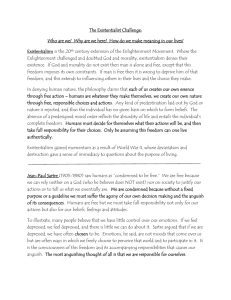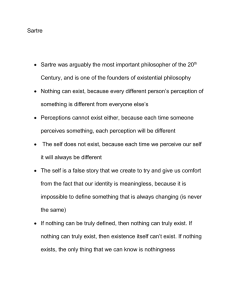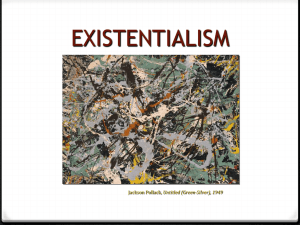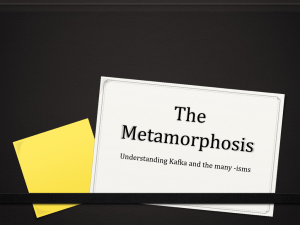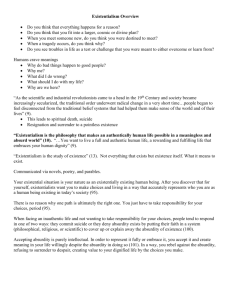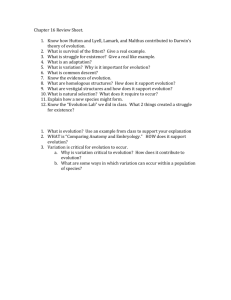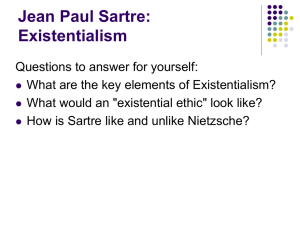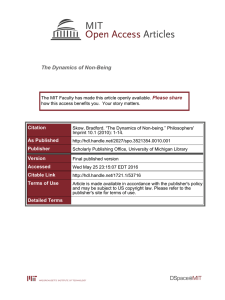010313 Existentialism
advertisement
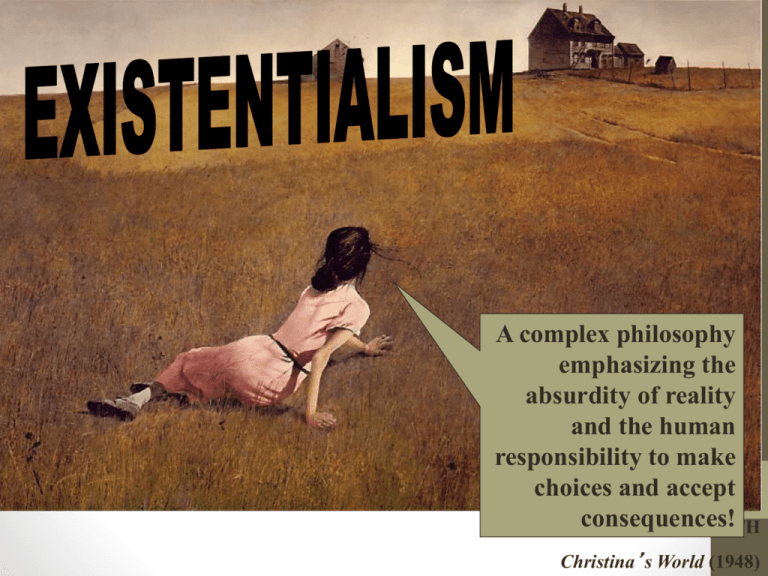
A complex philosophy emphasizing the absurdity of reality and the human responsibility to make choices and accept consequences! ANDREW WYETH Christina’s World (1948) Philosophia ~ Love of Wisdom • Metaphysics/Ontology: study of reality (existence, time, causation), nature of being, becoming, existence, or reality (what makes a human human) • Epistemology: study of knowledge • Logic: study of the principles of reasoning • Ethics: study of what is the right way to live and right way to act (morals) • Aesthetics: study of beauty Introduction to Existentialism • My 12th grade philosophy teacher, Ray Linn, introduced it to me (and Ms. Weiss) like this: • I remember watching the movie, the “Thorn Birds” on tv once and after seeing the priest die, I asked myself the question, “If we’re all going to die, then what is my purpose in life? Why do I exist?” One time or another we have all questions our existence. I think my purpose in life is to reproduce. Historical Foundations • Mid-19th century many thinkers tried to answer the unanswerable questions of “What is the purpose of life?” • Begin questioning human existence as a result of social conditions of the time, namely the industrial revolution. • Industrialization (people living by the clock), modernization (working to be able to meet their growing desire for material goods and technology) and secularization (turn away from religion) cause miserable conditions • Miserable conditions of the Industrial Revolution of the 1800’slead to people doubting their lives • Note people are still Christian, but religion is no longer at the forefront of daily life and societal functioning. Friedrich Nietzsche • German philosopher, poet, composer cultural critic • Franco-Prussian War (German unification), brutish German Nationalism, anti-semitism • Father dies at age 5, brother dies as an infant • Radical questioning of truth, crisis in values institutions (“G-d is dead” The Gay Science 1882) • Deemed insane by many during his life, taken seriously decades later • Influences rise of existentialism in 1940’s Neitzsche in a Nutshell • Provides secularized answer to human existence • Claims humans need to take responsibility for their lives and their actions. • He declares that humans should create life on the level of an artist • He advocates confidence to overcome what is lacking in oneself • He claims one needs to conquer what they lack and can be done utilizing four qualities: • • • • 1. cheerfulness – go out with a sense of motivation 2. Patience – don’t focus on yourself all of the time 3. unpretentiousness – strong people are not gaudy 4. contempt for true vanities Nietzsche Continued. • Everything is based on chance (genetic makeup, wealth, appearance) • There is no one particular self, there are many possibilities • Believes most people are weak and do not take responsibility for their decisions in life • There must be a process of “becoming.” This occurs through process of creating which comes from a life of selfexamination. • One must questions suffering, but ultimately accept it as part of the human condition. • Man exists as a will to power. Almost a century later, during the Second World War, when Europe found itself in a crisis faced with death and destruction, that the existential movement started by Nietzsche began to flourish. It was popularized in France in the 1940s. GEORGIO DE CHIRICO Love Song Big Ideas of Existentialism Despite encompassing a huge range of philosophical, religious, and political ideologies, the underlying concepts of existentialism are simple… MARK ROTHKO Untitled (1968) Cogito ergo sum. Existence Precedes Essence • Emphasizes the existence of the human being, the lack of meaning and purpose in life, and the solitude of human existence. • Who we are is not genetically predetermined. • The human being has no no essential self. • Man is a conscious subject, rather than a thing to be predicted or manipulated • Exists as a conscious being and not in accordance with any definition, generalization or system. • “I am nothing else but my own conscious existence.” Absurdism • The belief that nothing can explain or rationalize human existence. • There is no answer to “Why am I?” • Each of us is here, thrown into time and place, but why now? • Humans exist in a meaningless, irrational universe and any search for order will bring them into direct conflict with this universe. • World is chaotic with no inherent plan or blueprint Anxiety MAN RAY Les Larmes (Tears) Anxiety & Anguish • Generalized uneasiness, fear or dread • Anxiety is the result of human understanding and recognition of absurdity. • The absence of any plan or socially defined self, and the existence of total freedom of choice, leads to anxiety. • Universal condition of human existence • “My total freedom is also my total responsibility to define the meaning of my situation in the world.” Alienation EDGAR DEGAS “L’absinthe” (1876) Alienation • Alienated from: • The self • Nature (result of science) • Product of labor (result of factory model which has turned human into mechanical component) • Human institutions (government, politics, religion, corporations etc.) – we do not feel like we are a apart of them and do not understand how they work • From history ( no sense of our roots creating a meaningful past) present and future • “the Other” (all family, social and work relations) • Alienation dominates love Then How is Meaning Created and the Self Defined? • THE OTHER…da da dum • Those different from us • Oppress through language (desire to be at the top, use language to put down others and gain status) • Functions in 2 ways: • Awareness that in an absurd world we are always being judged, thus we are the other. As we want to avoid feel like this we… • Further alienate “others” as a way to define the self, by feeling “superior” to the other. “If you are bad then I am good, thus not bad” mentality • Nazi’s:Jews (etc.), Slave/Master, Savage/all other teachers • Read The Painted Bird analysis Human Subjectivity “I will be what I choose to be.” It is impossible to transcend human subjectivity. My emotions are yet another choice I make. I am responsible for them. Edward Hopper “New York Movie” (1939) Nothingness EDVARD MUNCH Night in Saint Cloud (1890) Nothingness • “Nothingness is our inherent lack of self. We are in constant pursuit of a self. Nothingness is the creative wellspring from which all human possibilities can be realized.” –Jean-Paul Sartre • Nothingness results when no essence defines me and I reject all structures that seek. • I am my own existence, but when I have stripped away all structures of knowledge, moral values and human relationship, I stand in anguish in an existence of nothingness. Death • Death is always present • “Hangs over me like a sword” • The unaware person tries to live as if death is not actual, he tries to escape reality. • Argument 1 (Heidegger): • Death is the most authentic, Significant human experience • If one acknowledges and accepts death they are free to escape anxiety and become themselves. • Argument 2(Sartre): • Death is as absurd as birth • It is the ultimate nothingness wiping on my conscious being • Death is another example of the absurdity of existence Choice and Commitment • Humans have freedom to choose. • Each individual makes choices that create his or her own nature. • Because we choose, we must accept risk and responsibility for wherever our commitments take us. • “A human being is absolutely free and absolutely responsible. Anguish is the result.” –Jean-Paul Sartre All existentialists are concerned with the study of being or ontology. TO REVIEW: An existentialist believes that a person’s life is nothing but the sum of the life he has shaped for himself. At every moment it is always his own free will choosing how to act. He is responsible for his actions, which limit future actions. Thus, he must create a morality in the absence of any known predetermined absolute values. God does not figure into the equation, because even if God does exist, He does not reveal to men the meaning of their lives. Life is absurd, but we engage it! Some Famous Existentialists • Søren Kierkegaard (1813-1855) • Friedrich Nietzsche (1844-1900) • Jean-Paul Sartre (19051980) • Albert Camus (19131960) • Fraz Kafka (1883-1924) “A woman is not born…she is created.” de Beauvoir’s most famous text is The Second Sex (1949), which some claim is the basis for current gender studies. Franz Kafka • Born into a middle-class, Germanspeaking Jewish family in Prague, then part of the Austro-Hungarian Empire • Both parents were absent from the home with Julie Kafka working as many as 12 hours each day helping to manage the family business. Consequently, Kafka's childhood was somewhat lonely and the children were largely reared by a series of governesses and servants. Complicated and troubled relationship with his father that had a major impact on his writing • Conflicted over his Jewishness and felt it had little to do with him • Drafted to WWI but got a deferment by his work The Metamorphosis • Published 1915 (significance of date?) • Work deals with themes of alienation, physical and psychological brutality, parent– child conflict, characters on a terrifying quest, mystical transformations (absurdity) and the function of the other • As Gregor Samsa awoke one morning from uneasy dreams, he found himself transformed in his bed into a gigantic insect-like creature. Albert Camus • French author, journalist and philosopher • Born in French Algeria (French colony in Northern Africa) • Father died in Battle of Marne in WWI • In 1934 marries a morphine addict, divorce due to infidelity • Marries again, but argues that “the institution of marriage is unnatural” • Joins French resistance against the Nazi’s during WWII • Won the Nobel Prize for literature in 1957 The Stranger (1942) Albert Camus dissociated himself from the existentialists but acknowledged man’s lonely condition in the universe. His “man of the absurd” (or absurd hero) rejects despair and commits himself to the anguish and responsibility of living as best he can. Basically, man creates himself through the choices he makes. There are no guides for these choices, but he has to make them anyway, which renders life absurd. “You will never be happy if you continue to search for what happiness consists of. You will never live if you are looking for the meaning of life.” “It was previously a question of finding out whether or not life had to have a meaning to be lived. It now becomes clear, on the contrary, that it will be lived all the better if it has no meaning.”
